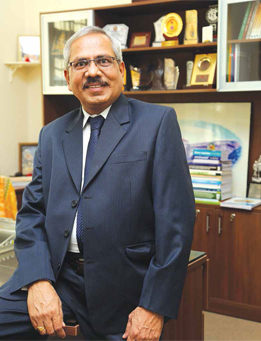
Commerce is the lifeline of a country’s economy, and the Brihan Maharashtra College of Commerce (BMCC) is perhaps the biggest testament to this statement. Established in Pune in 1943, its history mirrors the radical transformation of modern independent India-roots deep in rich cultural heritage and branches welcoming the winds of the future. BMCC’s founders played a crucial part in the fight for Indian independence, and even today, the college’s eminent alumni plays a huge role in shaping not just India’s economic landscape, but also the political and social arenas. The most remarkable characteristic about BMCC, however, is not its storied legacy, but its ability to constantly innovate on its education delivery techniques while never losing sight of the altruistic objectives of its revolutionary founders. Corporate Citizen sits down for a chat with Dr C N Rawal, Principal of BMCC, to understand its glorious legacy, its unconventional methods of education, and its bright plan for the future...
BMCC's parent body is the Deccan Education Society, which was formed by freedom fighters such as Lokmanya Tilak, Vishnu Krishna Chiplunkar, Gopal Ganesh Agarkar, and Mahadev Ballal Namjoshi. When the society began its work in the primary, secondary, and higher education sector, the educational infrastructure in Maharashtra was in its nascent stages, and there was an acute need for a college to catering to students interested in commerce. With that sole objective, BMCC was established in 1943. The work towards establishment of the institute started in 1942, keeping in mind the requirement of the growing Indian industry and their manpower needs at that period.
There wasn't a single commerce college in the city or even around Pune for that matter. This was pre-independent India, and there was a college only in Mumbai at that time. Apart from that, there were no commerce colleges in India to speak of. Pune used to come under the Bombay Jurisdiction at that time. The Government of Bombay notified in the gazette on 27th May 1943 that an approval was given to commence the commerce college, and work was immediately started. Initially, there was no building for the college, and it was decided to start the college in the Fergusson college campus, which is again another prestigious college started by the Deccan Education Society. In the early days, the lectures were conducted in the amphitheatre of Fergusson College, and that continued for five to six years. Gradually, the main building of BMCC was constructed, which stands to this very day. Fortunately in those days, we had many prestigious people coming to the campus to share their experiences. Many faculties came all the way from Mumbai to conduct lectures.
There were about 250 applications for the first batch, and out of them 150 were shortlisted. The shortlisting tradition started from the very beginning of the college, and it continues even today (laughs).
We are very fortunate to have legends in the field of economics and banking to have graced our halls. D G Karve was our first Principal and he laid the foundation stone of BMCC. It was his decision about how the college would operate then and for years to come. Whatever plans he and the founders laid, whatever structures they established, they are still in place. I am very happy to share that even after Karve, the subsequent Principals too have left their mark and their legacy on the fabric of the college.
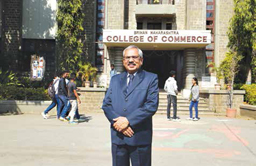
One of the reasons is that BMCC does not limit teaching just to its classrooms. Being a commerce college, we believe that the students should get hands on experience. When we talk about commerce and management, there are some concepts, such as planning, co-ordination, scheduling, reporting, and budgeting, which are inculcated in both classroom teachings as well as outside. BMCC conducts between 100-150 activities per year, like Astitva and Troika. We started Astitva with only 30 students, and last year over 1600 students from different colleges participated. We have marketing fests. We have several programmes where we invite speakers from different walks of life, and the best part is that these activities are planned, organised and executed by students. We also insist that the students manage the finances, as well as make a surplus on the budget. The surplus is then given to NGO's of the students’ choice. This is nothing but a type of small business structure in which they are playing different roles, which would later benefit them greatly in life. Raising money from the market isn't easy, but the students have been doing just that. We try to inculcate responsibility, innovation and a CSR in the students through these activities.
“BMCC has won ‘The best college award’ under SaVITRIBAI PHULE Pune University. We also have received a special recognition from the UGC as ‘College with potential for excellence’. For three consecutive terms, BMCC has been receiving this Pics: Yusuf Khan recognition”
We have more than 150 students every year in the cultural department. One full building with the hall has been given to them 24/7. In Pune, there are around 30 competitions and outside Pune there are more than 12 competitions, so more than 45 competitions take place every year. In all these competitions, our students participate. This is the way in which we are able to attract all types of students. We believe in integrated human development.
We give a lot of exposure to sports students. Whatever is required, whether teaching, whether evaluation assistance, or even requesting the University to arrange their examination separately, we provide all the assistance to sports students, which is why BMCC is their top choice.
There is a big list of the alumni, who have contributed to the economic, sports and social development of the country. To name a few, Sharad Pawar is also our alumni. Ram Naik is the present Governor of Uttar Pradesh; he placed a big role in the central ministry when he was the Railways and Petroleum minister. Arun Gujrathi was a speaker in Maharashtra. This is just pertaining to Politics, In civil services, there are several more, Not just that, In Bollywood, we have luminaries such as Mohan Joshi, Ameya Wagh, and many others. Also, like you mentioned, Cyrus Poonawalla is known the world over for his work in the Serum institute.
BMCC has given a lot of importance to sports. Physical Training is compulsory. If you fail PT you won’t be promoted to the next class. Health is wealth, and we believe sports are really important to maintain it
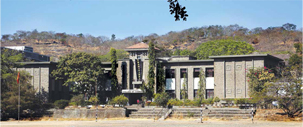
The total area of the college is 12 acres. In this area, we keep adding new infrastructure ahead of time to meet the needs of our students. Recently, we have added a girls’ hostel, which can accommodate nearly 210 students. It is a unique girls hostel in Pune. It is completely self-contained, which includes a canteen and solar panels. We organise over 15 programmes a year for them. It is not just a hostel; we want to groom them completely for their future. We provide medical checkups for them regularly. We hold lectures for them on subjects that matter to them the most, for example—use of mobile phones, etc. We also organise Yoga classes for them.
Our library is in a heritage building. It was inaugurated in 1973. It is stocked with over 1 lakh books. We have online books and journals besides the hard copies. We have a well-equipped BBA building, from where we operate BBA, BCA, BBM IB and MCA courses. These are self-financing courses. They are designed to satisfy the interests of the industry and service sector.
The main building in which we are currently sitting is the very first building built on the campus and it too is a heritage building. We have renovated it recently, making it state of the art while retaining its legacy façade
This year we are starting the construction of the new gents’ hostel to replace the old one.
BMCC has given a lot of importance to sports. In BMCC, for junior college students, PT is compulsory. If you fail PT you won't be promoted to the next class. Health is wealth, and we believe sports are really important to maintain it. We have given several prizes for sports. We arrange special lectures for students. We conduct separate examinations for them. If necessary, we even request the University to conduct their exams separately. There are many sportsmen produced by the college. Nitin Kirtane, Amol Wakalkar, Ajay Shirke and recently Ankita Raina, Shivani Shetty and Aishwarya Pingale, to name a few.
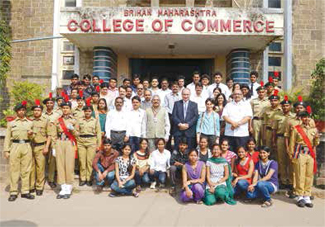
If you look at the syllabus of the Pune University, definitely it is satisfying the requirements of their stakeholders. However, there are some limitations. Every college has its own requirements as per the type of students it has. In BMCC, the cut off is over 90%. Naturally, the students are advanced learners. Their expectations are ever increasing. They like to correlate their expectations with the industry requirements. That is why there are some constraints. For example, we are using manual accounting in the syllabus, but the industry has moved to software packages like Tally for the same. Also, mergers, acquisitions, changes in financial laws, etc., happen in real time and it is necessary to incorporate these changes in the syllabus to prepare students for the industry.
I am happy to say that BMCC College has decided to go for autonomy. We have already submitted an application to the University, and the University has given an NOC. By the end of the month, we will submit our proposal to UGC, and from academic year 2017, BMCC will be an autonomous institute. We have built a brand new accounting laboratory, which will be inaugurated in January 2017.
As far as the composition of the students is concerned, 30% of students are interested in making a career in culture or sports. Out of the remaining 70%, 20% are interested to pursue professional courses like CA and CFAI. The question remains about the remaining 50%. Out of them, 10-15% wish to pursue their own or family owned businesses. For the remaining students, we have a placement cell, which takes a keen interest in the students. We conduct classes on how to prepare resumes, how to appear for interviews, and aim to prepare them for requirements of the companies. We invite companies for placements in the campus. In the last couple of years, around 60- 70% students are placed. There are times when some students turn down lucrative jobs because they feel that even though the offer was lucrative, the job profile would be monotonous. This is how far thinking students have become.
No. Although BBA and MBA are gaining popularity, if you look at Pune University, you will find that the BBA and MBA courses are offered in very few institutes. In Pune, there are about four to five centres, along with our college, which come under that umbrella. BBA and MBA are specialised courses whereas the scope for B.Com is much broader. B Com is the Highway, and BBA is the service road. If you do B Com sincerely you get the opportunity to study more than 20 subjects in three years. It even covers BBA topics like HR, Marketing, Finance, Costing and Auditing. You also get an opportunity to learn two languages, including one foreign one. We offer French and German as options. This combination is very useful and there are tremendous opportunities. You become suitable in any sector, as commerce is essential wherever you go. Finance is the backbone of every industry.
We have three regular publications in BMCC. Besides that, we also have three in-house publications in English, Hindi and Marathi. We give plenty of opportunities for our students to come forward and express their views, opinions and experiences related to the market. Independence of thoughts is very important. All are publications are taken care by the students. Right from the design of the magazines to the selection of the content and photographs, it is all handled by the students. They have complete autonomy over the publishing process. Since the last four years, we have been winning awards and prizes of the Savitribai Phule Pune University.
BMCC has won 'The best college award' under Pune University. We also have received a special recognition from the UGC as 'College with potential for excellence'. For three consecutive terms, BMCC has been receiving this recognition. My proposal for 2015-2020 has been approved, and we have received financial assistance from UGC to the tune of Rs. 1.5 crore.
Urawade is a village in a very interior part of Pune district. Since the last six years, we have been working there. We have a very close tie up with the villagers, and we regularly host programmes there, educating them about the new schemes introduced by the government, creating awareness about the need for education, and conducting their medical checkups. Many students from the village are interested in going for higher education. Counselling and support is provided to them. We have students from over 22 countries. Interacting with villagers gives them exposure to life in rural India, which they otherwise would not get.
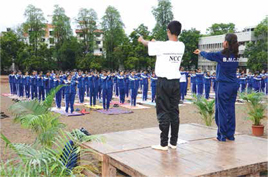
I have started Astitva in 2010, an event to celebrate Indian ethnicity and heritage, and it kicked off with only around 30 students and since then it has blossomed beyond my wildest imagination. Last year, the participation of students was 1600.
I mentioned earlier about the successful construction of the new ladies hostel, which can now accommodate over 210 girl students. I also took the initiative of renovating all the legacy buildings, including heritage ones, to make them state of the art. We have expanded our digital library by adding a large number of e-journals, e-books and volumes of articles. We have also started a UGC networking centre, whereby 20 additional computers have been installed with free internet access for students. We have also constructed a 3rd and 4th floor of the DB building. One of the technology initiatives I have overseen is the equipping of all classrooms with LCDs, and we have started installing smart boards in almost a dozen classrooms. Smart boards are interactive whiteboards which can display content as well as allow teachers and students to interact with it.
In addition to the above, we have started a special research journal called Brihan. Brihan is devoted to a special purpose every year. Last year, the topic was Dr Babasaheb Ambedkar.
We are organising visits for students to different service organisations, like RBI, SEBI, BSE etc. Recently, some of our students went on a three country tour of Europe for industrial exposure.
Our two collaborations are in the pipeline. One is with the Arizona State University, which is nearly finalised. I will soon be making a trip there to seal the tie-up. The other universities we are in talks with are in Italy and Germany.
The education system of any country decides the future of that country. Education has to be the priority, but unfortunately the ground reality is quite different. When I was a student, teachers used to come into the profession by choice. We were very fortunate to have good teachers. Nowadays, people are coming into the teaching profession not by choice, but because they couldn't get through elsewhere. That is the major difference today. Inculcating values has also become tougher now than it used to be. There is a need for talented, positive youngsters to look at academia seriously.
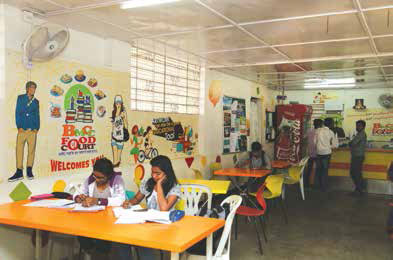
Those days have gone. Nowadays, teachers are not underpaid. Let me be very frank. When I started my career, the salary was only Rs. 1,700. Now, my young teaching staff who are just joining are drawing Rs. 40,000 easily, which is a very good amount to begin with. There are also career advancement schemes, and once you complete your PhD, you will be given four additional increments. If you complete MPhil, two additional increments are given. For performing teachers, the sky is the limit. It is important for youngsters and positive people to come into teaching. That is very important. Working alone is easy, but working with a group of students with varied backgrounds is difficult.
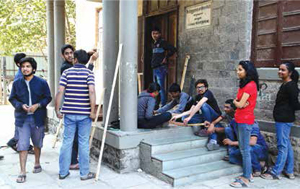
In our generation, we never used to question our teachers. What they told us would be the gospel. We also didn't have the resources to fact check what our teachers told us in real time. On the other hand, my students are so smart, they have their mobiles in their hands in the classroom, and the moment I quote the figures for a certain company for a certain year, they will come up to me after my lecture and say that "Sir, whatever you taught us is correct, but those were yesterday’s figures. Today's figure has been updated to this." Millennials have access to information. They are tech-savvy. They are smart, and they aren’t afraid to question teachers. They are very vocal and open. They come forward and raise all the relevant questions. Asking the right questions and keeping up with the time and technology is very important. This is the online generation. Many a times, they have better data than us. My experience with youngsters has always been good. Take them in confidence, assign them work, give them full freedom, and they will use their innovation and creativity to the hilt. Youngsters are the best performers, but you need to give them respect. You must not disrespect their diverse views.
No. I hail from an interior part of Maharashtra, a small village on the border of Ratnagiri an- Raigad districts. After completion of my SSC, I was interested in going for ITI, which in those days was offered only in Panvel in Navi Mumbai. I was shortlisted for the Motor Mechanic Trade course, but unfortunately, I could not make the final cut. At that point, I decided to go for higher education. With that in mind, I moved to Pune, as Pune has been an educational hub in Maharashtra for decades. I did B Com, M Com and M Phil. I also did MA in economics, followed by LLB. After that I did PhD.
My experience with youngsters has always been good. Take them in confidence, give them full freedom, and they will use their innovation and creativity to the hilt
I have been a student of almost all the colleges in Pune. I did my B Com from Yashwantrao Mohite (YM) College, M Com from Garware College of Commerce, M Phil from BMCC, MA from SP College, LLB from ILS Law College.
I got an offer to become a teacher, and I started my teaching career in Pimpri College. This was a short stint of six months. Then I began teaching at HV Desai College. There I started as a single faculty and expanded gradually as the college got into other educational streams. I gained much experience in these roles. Since 2009, I have been the Principal of BMCC.
Teaching is the only profession which creates all other professions. Teaching is the only field where you have the ability to influence the thoughts and hearts of so many youngsters. Only a teacher can inculcate lifelong learning skills among them. If you do your job well, students will remember you throughout their life. In my opinion, it's the noblest profession.
As a teacher, my motto is 'Nurturing young minds for inclusive and sustainable growth'. My life's motto is to become a good teacher in the minds and hearts of my students.
By Neeraj Varty